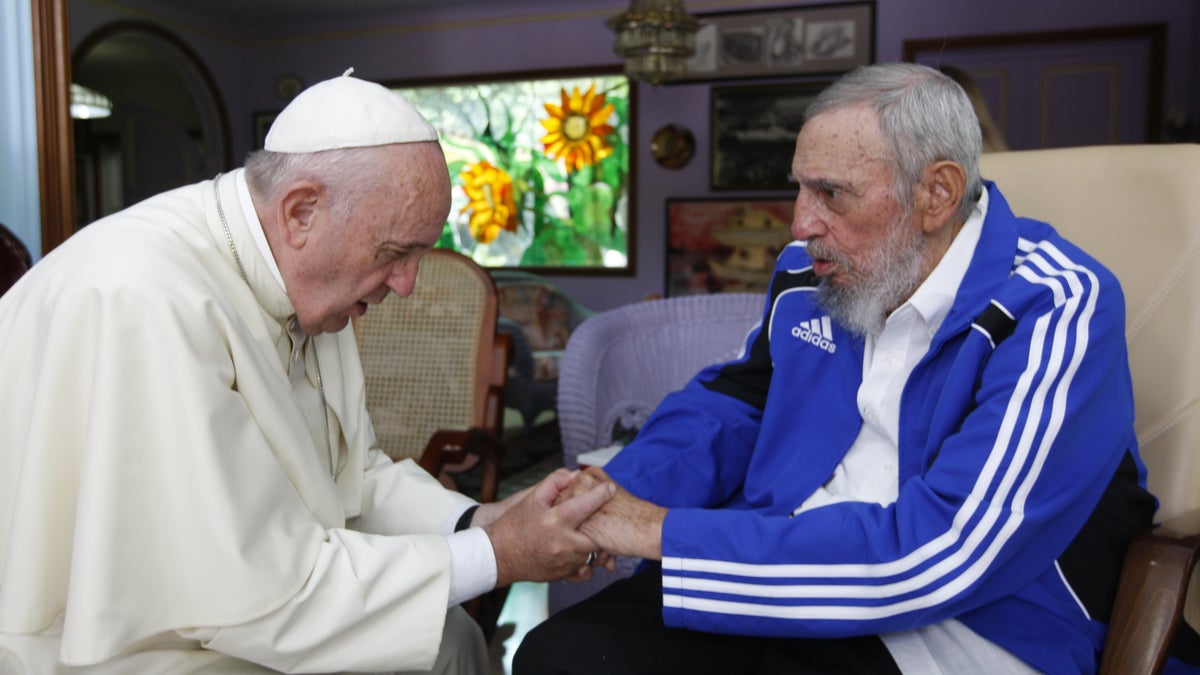
In this Sunday, Sept. 20, 2015 file photo, Pope Francis meets Fidel Castro in Havana, Cuba. (AP)
The death of Cuban leader Fidel Castro prompted celebrations among the country's exiles in Miami, expressions of sorrow from some world leaders, and measured responses from governments that never stopped seeing the devoted socialist as a threat.
On Saturday morning, President Barack Obama issued a statement saying the United States is extending "a hand of friendship to the Cuban people" and that "history will record and judge the enormous impact of this singular figure on the people and world around him."
A few hours earlier, President-elect Donald Trump had taken to Twitter and simply stated: "Fidel Castro is dead!" But later in the day he said in a statement that Castro was a "brutal dictator" who oppressed his own people and left a legacy of "firing squads, theft, unimaginable suffering, poverty and the denial of fundamental human rights."
Within half an hour of the announcement Saturday of the 90-year-old revolutionary leader's death, cheers were heard in Miami's Little Havana. Thousands of people banged pots, waved Cuban flags and whooped in jubilation. "Cuba si! Castro no!" they chanted, while others screamed "Cuba libre!"
However, Castro was honored and mourned by some present and former national leaders – especially in Central and South America governments that have remained close to the Castros through the decades.
Venezuelan President Nicolas Maduro recalled Castro's departure from Mexico on the yacht Granma with his brother Raul and several dozen supporters to start their revolution.
"Sixty years after the Granma sailed from Mexico, Fidel sails toward the immortality of all those who fight their whole lives," Maduro tweeted. "Onward to victory, always!"
Bolivian President Evo Morales said on Twitter that Castro was "the leader who taught us to fight for the sovereignty of the state and the dignity of the peoples of the world."
Meanwhile, Salvador Sanchez Ceren, the president of El Salvador, said he felt "deep sorrow ... of my friend and eternal companion” and Mexican president Enrique Pena Nieto tweeted: "Fidel Castro was a friend of Mexico, promoting bilateral relations based on respect, dialogue and solidarity."
Ecuadorian President Rafael Correa said Castro inspired the progressive and integration processes in Latin America.
"We're sad, but at peace, because the commander completed his mission, blazing paths that have inspired many of us who desire a more just, more equitable, more equal Latin America," Correa said.
"Cuba is in mourning, Latin America is in mourning," he said during his regular Saturday address.
Pope Francis was also quick in offering his condolences.
In a telegram to Raul Castro, he offered his "sense of grief to your excellency and family."
In a sign of his personal esteem, Francis signed the telegram, breaking from the Vatican's usual practice of have the secretary of state send such messages. Francis met Castro during the papal visit to Cuba in September 2015.
Also by telegram to Raul Castro, Russian President Vladimir Putin said the “free and independent Cuba which he and his allies built became an influential member of the international community and became an inspiring example for many countries and nations."
A statement from the Spanish government hailed Castro as "a figure of enormous historical importance."
"As a son of Spaniards, former president Castro always maintained close relations with Spain and showed great affection for his family and cultural ties. For this reason Spain especially shares the grief of Cuba's government and authorities," the government statement said.
There were shouts and insults in Madrid as a small crowd composed of both pro- and anti-Castro supporters met in front of the Cuban embassy.
"Fidel Castro in the 20th century did everything possible to destroy the colonial system, to establish cooperative relations," former Soviet President Mikhail Gorbachev was quoted as telling the Interfax news agency.
"Fidel survived and strengthened the country during the most severe U.S. blockade, while there was enormous pressure on him, and still led his country out of the blockade on the road of independent development."
Based on reporting by the Associated Press and EFE.








































